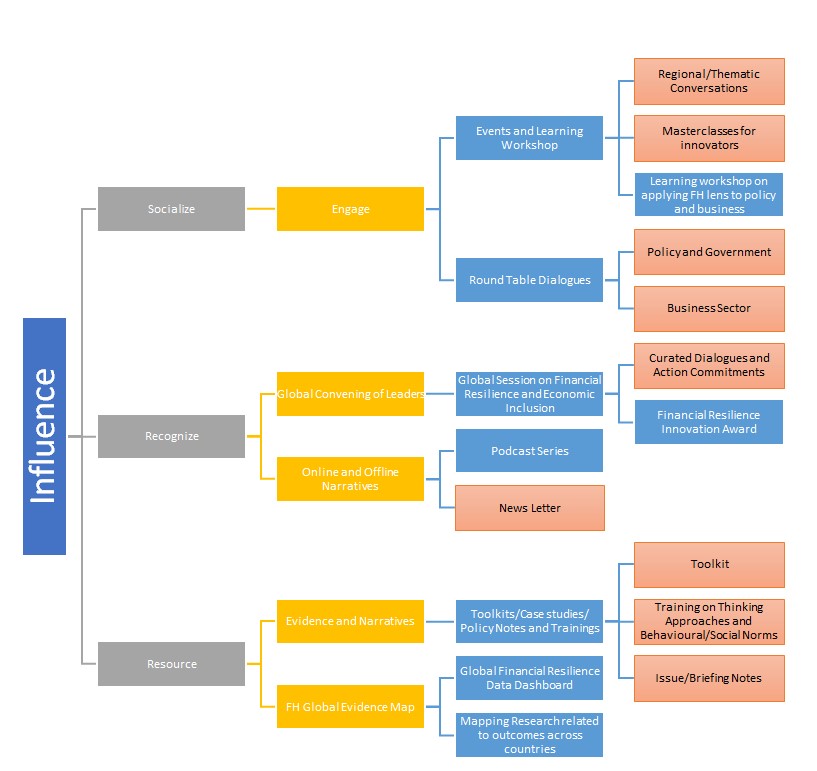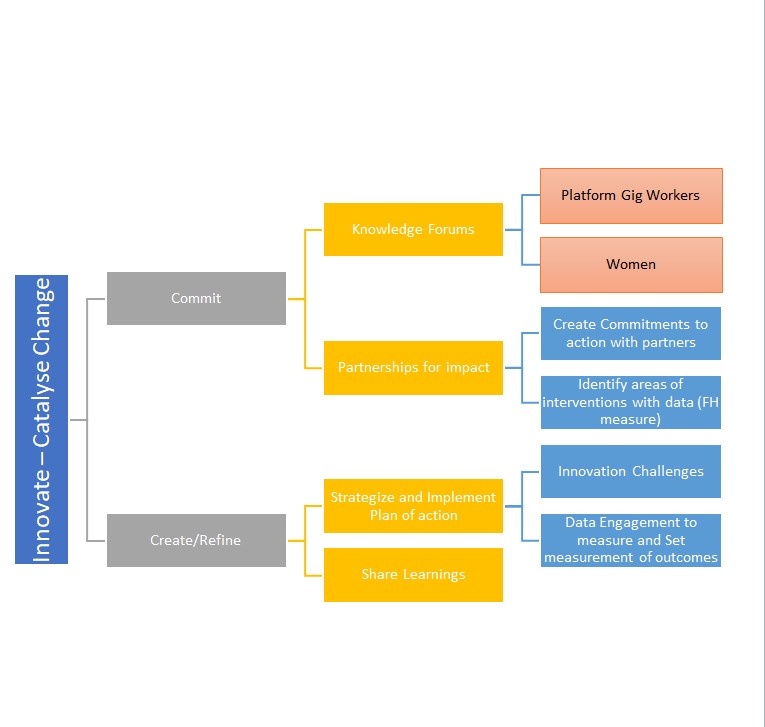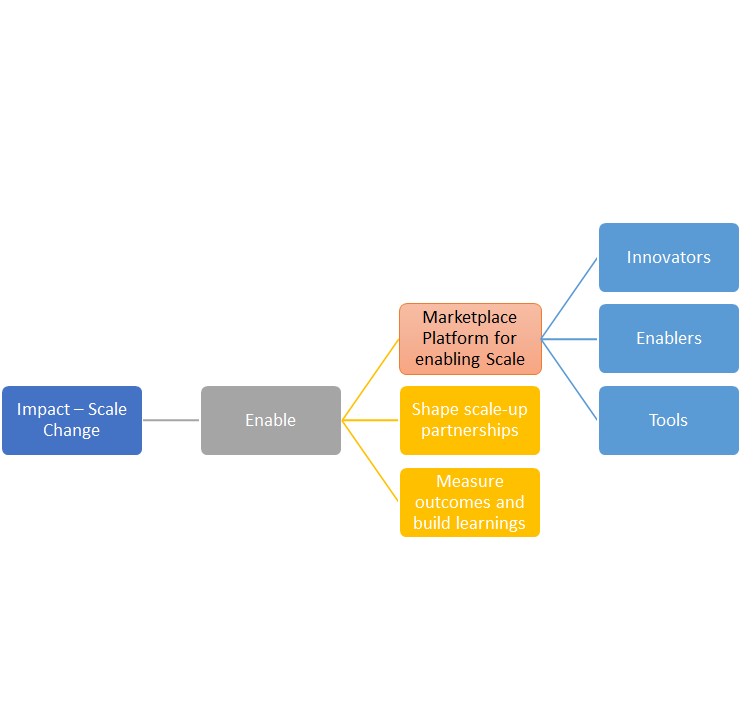About The Program
Financial inclusion has been a top priority for policymakers and the private sector, as it addresses the issue of formalization and assists households/individuals in breaking free from the cycle of poverty. Despite the widespread opening of bank accounts and access to credit through various models like microfinancing, the cumulative effect of these initiatives and their contribution towards building resilience and security remains largely unanswered.
We at i3-Access endeavour to initiate a conversation and connect policymakers and the private sector to shape a new vision for financial inclusion that emphasizes outcomes rather than outputs. Through this platform, we aim to deliver impactful solutions to low and moderate-income communities, particularly women.
We aim to provide a space where stakeholders can share ideas and collaborate on initiatives that empower individuals and households to achieve long-term financial security. By focusing on outcomes and prioritizing the needs of vulnerable communities, we want to drive meaningful change and make financial inclusion a truly inclusive and empowering process.
The following are the proposed objectives of the global community of practice (COP) – Action Platform:
- Assemble a body of financial resilience knowledge through research, toolkits, and case studies
- Support service providers in developing and implementing financial resilience strategies and solutions
- Convene knowledge groups around financial resilience and facilitate knowledge sharing among service providers and a broader audience
- Enable dialogue on financial resilience between the private sector and government/policymakers
The Community of Practice (COP) is hosted by Access Development Services and with support from IFMR Lead Krea University.
Click here to visit the COP website
The following are the proposed objectives of the global community of practice (COP) – Action Platform:
- Assemble a body of financial resilience knowledge through research, toolkits, and case studies
- Support service providers in developing and implementing financial resilience strategies and solutions
- Convene knowledge groups around financial resilience and facilitate knowledge sharing among service providers and a broader audience
- Enable dialogue on financial resilience between the private sector and government/policymakers
Vision for the Community of Practice – Action Platform
We are championing Financial Health for the world’s vulnerable populations to thrive.
We are building on our collaborative strength and expertise in Financial Inclusion and Health with a mission to support people worldwide to thrive.
We represent a simple but forward-thinking idea: when individuals are financially resilient, they can prosper with opportunities to live full lives and overcome life’s uncertainties.
We encourage financial well-being for everyone so that, working together, we can build a more joyful and resilient society.
Approach
Establishing a successful global effort around Financial Resilience requires a combination of technical and advocacy leadership skills, which can encourage institutions and individuals to engage and participate on an ongoing basis. This effort must also ensure that ongoing initiatives are well-integrated and support a common narrative.
To achieve these objectives, the COP (Community of Practice) can serve as an action platform for stakeholders to interact and engage for meaningful impact. The applicant is proposing to set up a team and consortium partners to shape an infrastructure that can continue to serve the convening needs of the agenda for years to come.
To achieve this, we are implementing a three-pronged action framework where each action is carefully mapped to contribute towards the development of the narrative, capacity building, or delivering impact. By following this framework, we can effectively engage stakeholders, build their capacity to take action, and deliver meaningful impact in the space of financial resilience.
Actioning the Collective and Collaborative approach
Action 1: Influence
The primary objective of this action is to shape a compelling and impactful global and local narrative around the concept of financial resilience. This will involve bringing together a diverse range of stakeholders from different levels of society to learn from and share with each other on the topic. Through this approach, we aim to highlight the different actions that can deliver positive impact, as well as identify areas that require further attention and action. An additional focus of this initiative is to build the capacities of stakeholders, enabling them to drive innovation and take action in this critical area. To achieve this, we will use a range of interventions, including training, masterclasses, and the development of resources such as toolkits, case studies, and research papers. These resources will provide valuable insights and serve as practical tools to inspire and enable internal action with stakeholders.
Our ultimate goal is to create an ongoing mechanism to engage and inspire stakeholders to have meaningful conversations around financial resilience. To achieve this, we will use a range of tools and channels to create and disseminate targeted content to different stakeholder groups. This work will be positioned as a public good, supporting the development, thinking, and implementation of crucial Sustainable Development Goals (SDGs) related to financial resilience.


Action 2: Innovate
The process of constructing narratives only holds significance if there are stakeholders who are eager to progress and take action. This particular area of action is focused on bringing together those institutions that have previously demonstrated a definite interest in participating, and testing their learnings through collaboration. By creating a knowledge forum that concentrates on specific segments, this collaboration can provide partners with the necessary data tools to identify areas of intervention, build actions that can be addressed in the short to medium term, and work together to achieve these goals. The framework and its various activities are designed to foster a dedicated and long-term engagement with partnerships, specifically focusing on delivering impactful customer outcomes.
This action-oriented approach can help stakeholders better understand what works and what doesn’t, which is a critical component in determining whether scaling is a viable option.
Action 3: Impact
The impact agenda aims to expand upon previous actions by increasing the availability of services that provide greater value to low and moderate-income households and individuals. This involves a deliberate focus on replicating and adapting successful models that have been proven to work in specific geographies or segments in order to make them available in other areas.
In order to drive this expansion, it is essential to build a convincing business case that will generate support from stakeholders and ensure that the benefits of these innovations are accessible to all. While each of these actions can be considered separately, they are inextricably linked and form part of a continuous feedback loop that helps to enhance learnings and inform future activities. Ultimately, this approach will contribute to a more sustainable and equitable society where everyone has access to the services and support they need to thrive.

Reach Out For More Details
Our immediate focus is to invite members who can spearhead the agenda and focus areas of our Community of Practice.
If you are interested, please reach out to us at :


